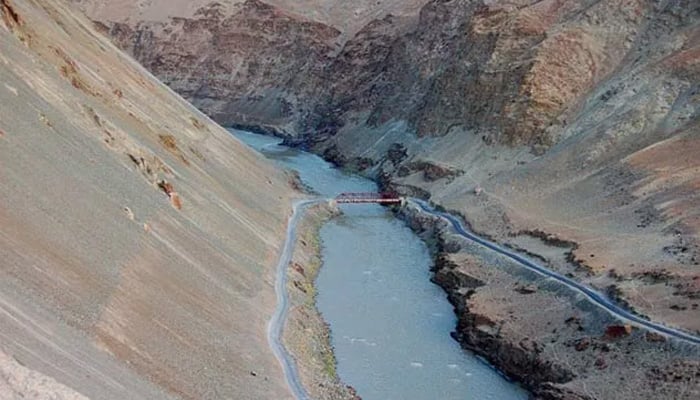If the Indus goes, we go too
Water, long a quiet undercurrent in the hostility between India and Pakistan, has surged to the forefront
May 02, 2025

As Himalayan glaciers retreat and temperatures rise, South Asia’s rivers are becoming weapons of survival, not just sources of life. Nowhere is this more dangerous than along the Indus River, where the 1960 Indus Waters Treaty — once celebrated as a landmark of cooperation between bitter rivals India and Pakistan — faces its greatest test in a rapidly warming world.
The breaking point came in April 2025. After a terrorist attack in Jammu and Kashmir, India cited national security to abruptly suspend participation in the treaty, severing crucial data exchanges and warning of more upstream controls. Over the last few years, in villages across Pakistan’s Punjab, farmers like Tariq Mehmood have been watching helplessly as the Chenab’s waters continue to thin.
Water, long a quiet undercurrent in the hostility between India and Pakistan, has surged to the forefront. The stakes are existential for Pakistan, critically reliant on the western rivers for drinking water, agriculture and hydropower. As climate shocks intensify and upstream control tightens, a stark question emerges: Can a vulnerable lower riparian nation hold its ground against a powerful upstream neighbour?
Signed with the World Bank’s mediation, after violent water disputes following the 1947 Partition, the Indus Waters Treaty allocated the Indus, Jhelum and Chenab to Pakistan, while India retained the Ravi, Beas and Sutlej. But critics argue the treaty’s safeguards are crumbling. Projects like the Kishanganga and Baglihar dams — under strict conditions — have allegedly eroded downstream flow, a threat compounded by the accelerating impacts of climate change, which continue to diminish overall water availability across the region.
The legal battle is messy. India asserts its hydropower developments fall within treaty rights. Pakistan’s officials, scrambling to trigger international arbitration, argue India is breaching the treaty’s spirit and weaponising water.
Other lower riparian states tell similarly cautionary tales. For decades, the Middle East has struggled to secure fair access to the Jordan River, often turning to global courts, regional forums and diplomacy with little success. Egypt’s fight over the Nile, challenged by Ethiopia’s Grand Renaissance Dam, highlights the difficulty of protecting historic rights in the face of upstream ambition. Iraq and Syria, battered by Turkey’s control of the Tigris and Euphrates, found economic sanctions and regional alliances an unreliable shield.
Southeast Asia’s Mekong states — Vietnam, Cambodia and Thailand — turned to environmental advocacy against China’s dam spree, while Bangladesh leaned heavily on regional diplomacy and technical resilience to manage upstream threats on the Brahmaputra.
The lesson for Pakistan is clear: survival requires a layered strategy. First, Pakistan must internationalise the Indus Basin dispute. The Permanent Indus Commission, designed for technical discussions, cannot shoulder the weight of today's geopolitical tensions.
Islamabad must escalate the matter to forums like the United Nations General Assembly and the Security Council and leverage the World Bank’s role as a treaty guarantor. The narrative must shift from bilateral grievance to planetary concern in the global climate era.
Second, legal tools matter — not only for shaping political narratives but also as technical instruments. Egypt’s persistent appeals to African institutions, though slow to yield results, kept Nile concerns alive internationally. Pakistan must meticulously document every breach and seek advisory opinions from the SCO, International Court of Justice, and other global forums, reframing India’s actions as dangerous precedents in transboundary water law.
Third, technical resilience is non-negotiable. Strategic investments in desalination, rainwater harvesting, and drip irrigation can help buffer Pakistan against Indian pressure. Building reservoirs and improving water-use efficiency would not only mitigate the Indus Basin’s vulnerability but will also help to safeguard against future manipulation.
Fourth, alliances must be broader and sharper. China, wary of India's regional ambitions, has its own stake in keeping South Asia’s rivers stable. Even Bangladesh, mindful of its own upstream threats, could be a quiet supporter. Afghanistan, which shares nearly eight per cent of the Indus River Basin through the Kabul River, is also a crucial stakeholder.
Islamabad must engage Kabul proactively to prevent it from drifting toward alignment with India's water policy, which could further complicate the regional hydro-political landscape.
Finally, and perhaps most crucially, Pakistan must weaponise the climate argument. Climate change is not a future threat; it is already reshaping river flows, glaciers, and rainfall patterns across the region.
By framing India’s actions as reckless endangerment of a fragile ecosystem, Pakistan could rally environmental organisations, climate activists and sympathetic states in its support. The narrative must shift from being seen as a bilateral dispute to a warning about the broader collapse of water security in the climate era.
The implications stretch far beyond Pakistan’s fields. Reduced Indus flows would devastate agriculture, drive millions into overcrowded cities, ignite food shortages, and intensify border tensions in an already volatile nuclear neighbourhood.
The collapse of the Indus Treaty would not just be a diplomatic failure but a humanitarian catastrophe with profound global repercussions.
For Tariq Mehmood and countless farmers like him, the danger is no longer a distant threat — it is the dry well, the barren fields, the creeping shadow of despair. “If the river goes,' he said, 'we go too.”
The Indus Waters Treaty was intended to protect against such devastation. Whether it can still be salvaged amid rising temperatures, hardening nationalisms, and eroding trust will determine not just the future of India and Pakistan but the fate of the entire region, standing on fragile ground.
The writer is a legal and policy expert specialising in international law, water diplomacy and legislative reform. She can be reached at: [email protected]
Disclaimer: The viewpoints expressed in this piece are the writer's own and don't necessarily reflect Geo.tv's editorial policy.
Originally published in The News











